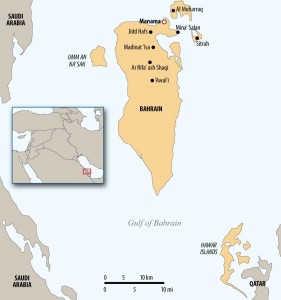Bahrain’s Sovereign Ratings Lowered; Outlook Negative
Capital Intelligence (CI), the international credit rating agency, said Wednesday that is has downgraded Bahrain’s Long-term Foreign and Local Currency ratings to ‘BBB+’ from ‘A’ and lowered its Short-term Foreign and Local Currency ratings to ‘A2’ from ‘A1’. The Outlook is ‘Negative’.
The downgrade in Bahrain’s credit ratings reflects the recent increase in political risk, which may have adverse consequences for economic growth and public finances in the short-term and beyond. The downgrade also takes into account the weakening of fiscal flexibility over the past few years, which has reduced the authorities’ capacity to cope with external shocks and will be harder to restore in the current climate.

Bahrain’s ratings are supported by the authorities’ track record of prudent macroeconomic management (notwithstanding weaker fiscal performance in the past two years), moderate – albeit increasing- government debt and the country’s small net external creditor position.
The civil unrest of the past two months has clearly exposed the fault lines – sectarian and economic – that run through Bahraini society. While the violence has abated following the imposition of a state of emergency and tightening of internal security, the underlying problems are unchanged and the risk of a low level insurgency will remain until a durable political settlement is achieved.
Prospects for such a settlement in the near future are not high. While there has been talk of a national dialogue aimed at addressing some of the grievances of the protesters, the divide between the government and opposition on key issues – such as the extent of political liberalisation, the power of the monarchy, and policies for addressing economic inequality and job discrimination – appears currently unbridgeable.
Depending on the extent of any further unrest, real economic growth is likely to be low or negative this year. Key sectors of the economy, such as the financial industry, which accounts for more than 20% of GDP, and tourism are likely to be hit hard. Other service sectors will also be adversely affected by the disruption to trade and decline in business and consumer confidence.
Medium-term growth prospects have become more uncertain due to the increase in political risk and the likely damage to Bahrain’s reputation as a relatively liberal regional financial centre – particularly at a time when competition for international business from other Gulf states is increasing. Higher political risk perceptions, if they persist, will make it harder to generate the private sector growth required to absorb the expanding Bahraini workforce over the coming years.
CI notes that Bahrain’s external finances were in good shape prior to the political crisis, supported by high oil prices and a small net external creditor position, and there have been no signs so far of excessive stress. CI recognises that capital outflows have increased but would expect any risks to financial system stability to be contained, in the near term at least, by banks’ holdings of liquid foreign assets, which in aggregate exceed their short-term foreign obligations.
With modest reserves, a fixed exchange rate and open capital account, the authorities’ capacity to cope with severe external shocks is limited. Significant erosion in the country’s financial buffers, were it to occur, would have negative credit consequences.
On the fiscal side, high oil prices should make expenditure pressures arising from the unrest – including increased security-related spending, promised one-off transfers to households and additional food subsidies – more affordable in the near term, although the state budget is expected to remain in deficit. CI is concerned, however, that the government may find it difficult to reverse temporary spending increases (particularly if political tensions linger), and that higher spending levels will make the budget more vulnerable to potentially volatile oil prices. 2
The threat to government finances from a sharp fall in oil prices has been a longstanding constraint on Bahrain’s ratings. This credit weakness has become more of a concern over the past few years with the growth of public expenditure and the lack of progress on broadening the non-oil revenue base. This signifies, in effect, that the budget has become increasingly reliant on the oil price rising. The oil price required to balance the 2011 and 2012 state budgets agreed last year (before the turmoil and additional spending measures) was estimated to be around USD100 a barrel; the break-even price was closer to USD70 a barrel in 2008 and was less than USD40 a barrel as recently as 2005.
The government of Bahrain lacks the fiscal reserves of most other Gulf States, and with a less flexible balance sheet, its room to use fiscal policy to counter economic shocks or to ease public discontent is more limited. Government debt is nevertheless moderate by international comparison, at about 35% of GDP – although it has more than doubled in nominal terms since 2008, reflecting budget deficits in the region of 6%-7% of GDP in 2009-10.
CI notes that Bahrain is expected to receive substantial financial support from the Gulf Cooperation Council (GCC) following its decision in March to provide the government with up to USD10 billion (equivalent to 45% of 2010 GDP) over 10 years to support economic development. Although the modalities of this funding arrangement are not yet known, it should, all other things being equal, help to protect spending on social and physical infrastructure from oil price gyrations and enable the government to reduce the amount of borrowing required for capital projects. Whether higher development spending will help ease social and political strains remains uncertain.
The availability of GCC grants does not, however, obviate the need for reforms to public expenditure and the revenue base that would enhance fiscal flexibility. In CI’s opinion, such reforms are less likely in an unsettled political climate.
If the political situation worsens, or if the public finances deteriorate, Bahrain’s credit ratings could be lowered further. Conversely, the Outlook could be revised to ‘Stable’ if political stability increases and fiscal risk indicators improve.
